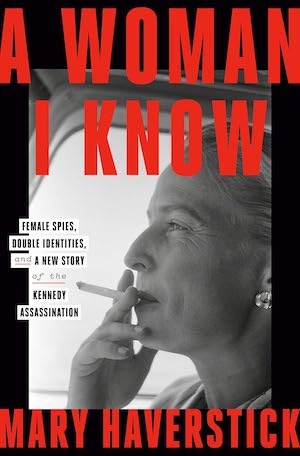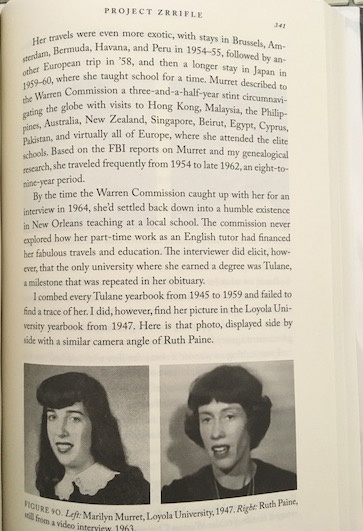This book was a quick and fascinating read. It’s very entertaining, which is not a good sign. I had been alerted by the author that there was new information about Ruth Paine included. Haverstick’s thesis is that her friend, pioneering female pilot Jerrie Cobb, was trading identities with (or was the same person as) spy June Cobb and that she was deeply involved in the JFK assassination.

I finished the book feeling like there was some good compelling information, but as I spent more time mulling it over, I began to doubt the trustworthiness of the author. Haverstick takes her argument a little overboard when she tries to claim that Jerrie Cobb actually flew a getaway plane into Dallas on 11/22/63 and then disguised herself as the Babushka Lady and used an advanced CIA gun disguised as a camera to score the fatal head shot on JFK! Perhaps she felt she had to include something this sensational to get a publisher or sell books, who knows? But, like many other claims in her book, she takes some gigantic leaps of faith in her analysis between evidence and conclusions.
I think it’s especially important within this hidden history pursuit to be responsible with your claims. On one hand, you open yourself up to ridicule and valid debunking when you start making unsubstantiated claims. On the other, you waste everyone’s time and simply add more confusing information into the mix. This is very irresponsible. It’s also something that the people actively working against us are involved in.
So, Haverstick does make a good case that Jerrie Cobb was a spy, but much of what she claims in the book depends on our accepting her “analysis” of the facts (and her word on what happened). She doesn’t often present us with documents; she seems much more concerned with creating drama and making grand conclusions. Maybe that’s from her background as a filmmaker.
I’m surprised that Haverstick’s book seems to be getting supported in certain circles, namely by Jefferson Morley. Haverstick was (and is) an outsider within the JFK community, but she did consult with John Newman, Lisa Pease and others. I think some people are cautious about being too harsh on her, but we must not be too shy about being critical.
Here is what Lisa Pease said recently on Twitter:
https://x.com/lisapease/status/1747848682836459940?s=20

I haven’t yet listened to Morley’s podcast with Haverstick, but I don’t like the credulous tone I’ve seen so far. Maybe there is more critical material here.
Here’s a thread on the Education Forum discussing the book. I think most people are incredulous, including Jim DiEugenio.
Robert Manz has also written critically, in three recent posts on his Substack.
Sadly, for me, the parts about Ruth Paine were among the least convincing points in the book (and that’s saying a lot). Haverstick throws out a theory that Ruth Paine could have been swapping identities with one of Oswald’s cousins in NOLA, Marilyn Murret, on the sole piece of “evidence” that they looked the similar!?
I think this book offers a few lessons:
– This shouldn’t be about entertainment
– Be wary of sensational claims
– Be wary of books published by the mainstream press
– Question what is real evidence vs. what is a “convincing” tale woven by the author
– Just because one smaller conclusion seems to make sense, doesn’t make the bigger one valid
– Don’t go down every rabbit hole or read every book that is offered to you
– It is surprisingly easy to write a book that is full of bullshit and a lot of people will believe it because it’s in a book

